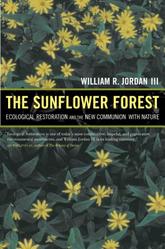 Image: Better World Books
Image: Better World Books Jordan's concept of shame is central to his work. For Jordan, shame is the acknowledgement of our complex and demanding interconnection with, and reliance on the life and death of the "other" whether plant or animal. Critically, shame is not guilt, a common and misleading conflation. While guilt can be addressed by corrections in one’s behavior (from apology to redress), shame is irresolvable because it is the awareness and acknowledgement of complete dependence and inter-dependence. Consumption, therefore, is an occasion for that awareness, an occasion for shame that must be recognized and dealt with.
It is shame-denial that has brought us to our current ecological condition of crisis, enabling as it does, thoughtless and endlessly increasing consumption. It is shame-denial that enables us to live our day-to-day economic lives consuming the world's resources, exploiting cheap labor in Asia and the Global South, while allowing unemployment, poverty and hunger to exist both here and abroad.
I've been thinking lately that Washington DC embodies in a microcosm what is wrong with our culture--and by extension with our relationship to nature. In the capital of the world's richest nation we find immeasurable wealth and power existing side-by-side with severe poverty, violence and destitution, as if a verdant rain forest would sprout in a dust-bowl field. In other words, there's nothing natural about Washington DC. This is an illuminating way to understand ourselves, since nature/culture are forever bound--the one is the other--and both the environment and people are suffering because of the denial of shame—the denial of dependence. And so it is productive to ask how we let such an unnatural and oxymoronic, condition to exist. Have the wealthy and powerful in Washington DC--and by extension all of us--no shame? As Voltaire famously said, “The comfort of the rich depends on an abundant supply of the poor.” Shame offers us a new/old way to look at ourselves.
Jordan urges us to consider the importance of facing our shame by carefully devising rituals and performances that enrich both us, as human beings, and the ecological system from which we come, and of necessity, must be relationally bound. These are what Jordan calls “technologies of the imagination” that ground us as humans and reveal our embededness in nature and enable us to move from shame to beauty. It is the same with our relations to each other. Jordan’s vision is not austere; he is in no way remonstrative. Jordan doesn’t impel us towards a bleak future, but instead towards the richness of what it means to be human living in the wealth of nature. The process is not easy, but instead troubling and difficult. Yet denying shame has gotten us where we are--and will certainly propel us into a more dystopian climate-corrupted future. To deny shame is to embrace ignorance. Worse, it is license to exploit; it is freedom without responsibility. Embracing shame allows us to live richly with each other and nature.
The Sunflower Forest should be widely read and discussed for its probing of our condition and its illumination of who were are as humans: complex, inter-relational and embedded beings in need of the means to negotiate our way, with each other and the natural world. In short, “How should we live?” That is the conversation so sorely needed, yet near universally ignored and denied, perhaps most egregiously so by those calling themselves the “new environmentalists”. That is the conversation we need to have, posthaste.
EJ Tangel,
Chicago
May, 2013
Read Liam Heneghan's review in Los Angeles Review of Books here
Buy The Sunflower Forest at your local bookstore (if you're lucky enough to still have one) or here
 RSS Feed
RSS Feed